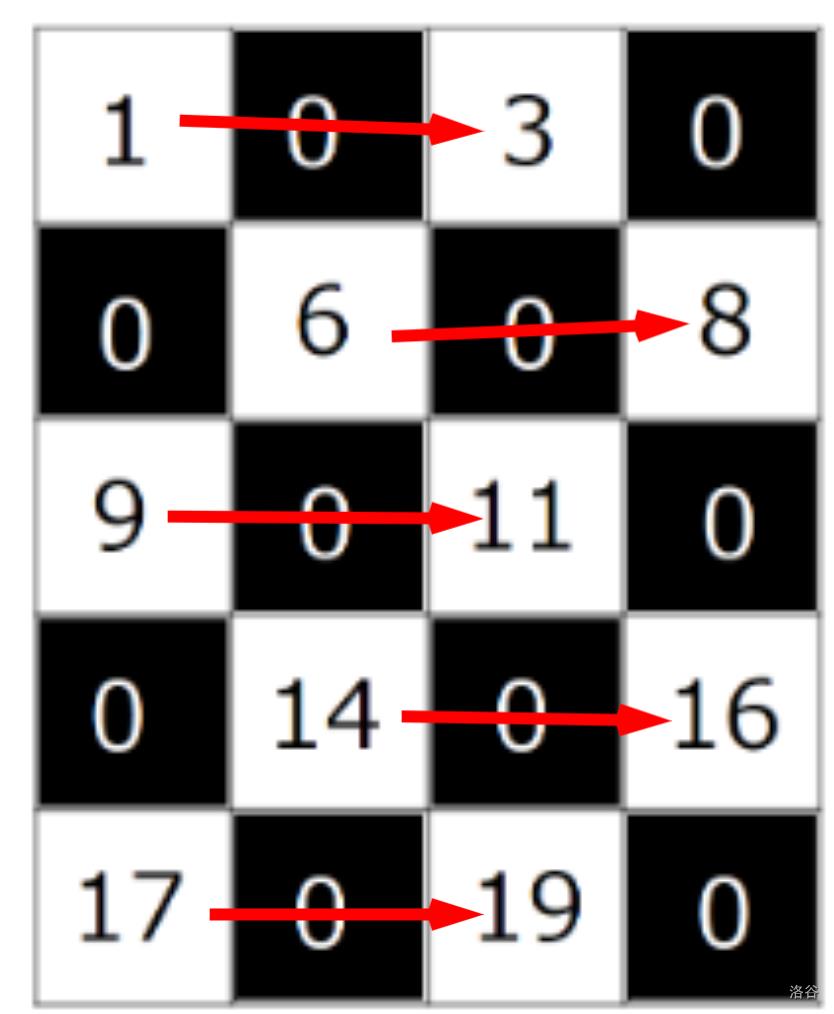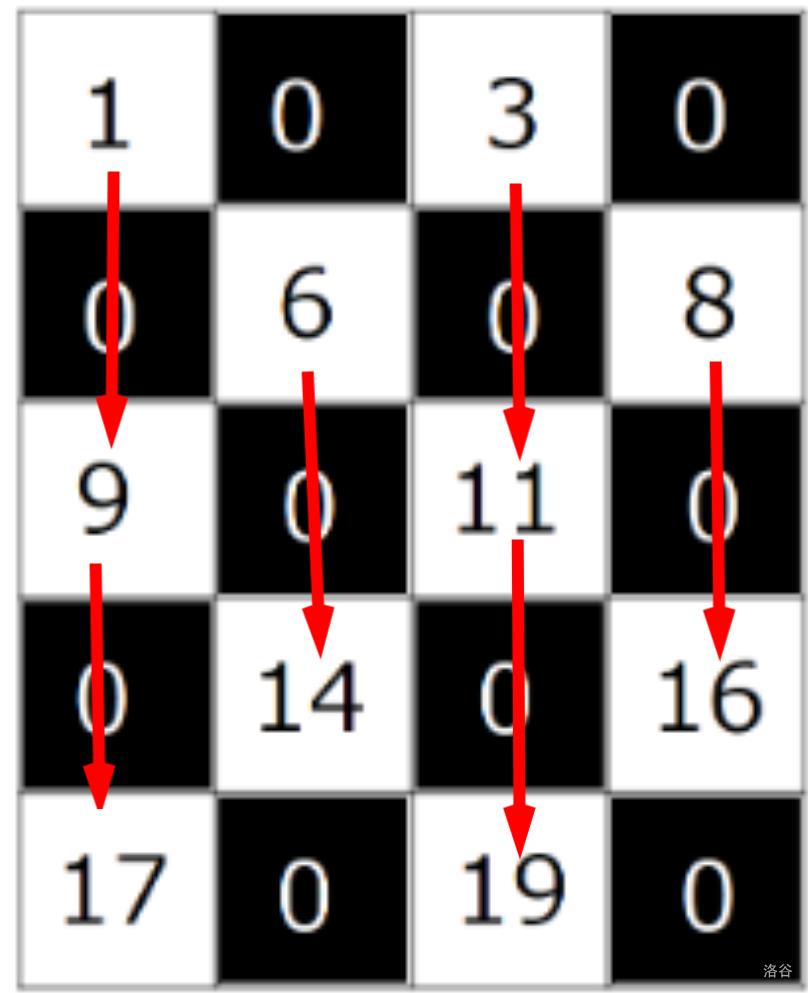abc269_f Numbered Checker 题解
Posted lw0的博客园据点
tags:
篇首语:本文由小常识网(cha138.com)小编为大家整理,主要介绍了abc269_f Numbered Checker 题解相关的知识,希望对你有一定的参考价值。
Numbered Checker
题意
有一个 \\(n\\times m\\) 的方格矩阵,左上角是 \\((1,1)\\),右下角是 \\((n,m)\\),每个方格中都有一个整数,其中 \\((x,y)\\) 中的数字为:
- 如果 \\(x+y\\) 是奇数,则 \\((x,y)\\) 中的数字为 \\(0\\)。
- 否则,\\((x,y)\\) 中的数字为 \\((x-1)\\times m + y\\)。
有 \\(Q\\) 组询问,每组询问给定四个整数 \\(a,b,c,d\\),求所有满足要求的 \\((i,j)\\) 中的数字之和:
- \\(a \\leqslant i \\leqslant b\\)。
- \\(c \\leqslant j \\leqslant d\\)。
答案对 \\(998244353\\) 取模。
思路
等差数列求和。
对于每组询问
暴力时间复杂度:\\(O(n\\times m)\\),爆炸。
推导壹
就拿第一个样例举例子。

可以很明显地发现,奇数行与偶数行排列虽然不太一样,但两者都是等差数列,且公差为 \\(2\\)。
经过仔细地推导(不给推导过程,自己推去),我们可以发现:
- 对于 \\(a+c\\) 为奇数的情况下:
- 第 \\(a\\) 行的等差数列首项为 \\((a,c+1)\\),项数为 \\(\\fracd-c+12\\)。
- 第 \\(a+1\\) 行的等差数列首项为 \\((a+1,c)\\),项数为 \\(1+\\fracd-c2\\)。
- 对于 \\(a+c\\) 为偶数的情况下:
- 第 \\(a\\) 行的等差数列首项为 \\((a,c)\\),项数为 \\(\\fracd-c2+1\\)。
- 第 \\(a+1\\) 行的等差数列首项为 \\((a+1,c+1)\\),项数为 \\(\\fracd-c+12\\)。
(以上除法均需带有向下取整)。
时间复杂度:\\(O(n)\\),还是不够优秀。
推导贰

可以发现,行与行之间也是等差数列!公差为 \\(2m\\)。
令当前询问第 \\(a\\) 行的等差数列之和为 \\(sum\\),项数为 \\(p\\);第 \\(a+1\\) 行的等差数列之和为 \\(num\\),项数为 \\(q\\)。
还是不给推导过程,答案就可以变成两个等差数列:
- 第一个:以 \\(sum\\) 为首项,公差为 \\(2\\times m\\times p\\),项数为 \\(\\fracb-a2+1\\)。
- 第二个:以 \\(num\\) 为首项,公差为 \\(2\\times m\\times q\\),项数为 \\(\\fracb-a+12\\)。
求出两个等差数列之和,将其加起来就是答案啦,注意取模细节。
时间复杂度:\\(O(1)\\)。
复杂度
- 时间:\\(O(Q)\\)。
- 空间:\\(O(1)\\)。
Code
#include <iostream>
using namespace std;
using ll = long long;
const int mod = 998244353;
ll n, m, t, a, b, c, d, p, q, sum, num;
ll id (ll x, ll y) // 将坐标转数值
return ((x - 1) * m + y) % mod;
ll Sum (ll s, ll d, ll n) // 等差数列求和公式
return (s * n + n * (n - 1) / 2 % mod * d % mod) % mod;
int main ()
ios::sync_with_stdio(0), cin.tie(0);
for (cin >> n >> m >> t; t; t--)
cin >> a >> b >> c >> d;
p = (d - c + 1) / 2, q = (d - c) / 2 + 1;
if ((a + c) % 2)
sum = Sum(id(a, c + 1), 2, p), num = Sum(id(a + 1, c), 2, q); // 套用公式
else
swap(p, q);
sum = Sum(id(a, c), 2, p), num = Sum(id(a + 1, c + 1), 2, q);
cout << (Sum(sum, 2 * m * p % mod, (b - a) / 2 + 1) + Sum(num, 2 * m * q % mod, (b - a + 1) / 2)) % mod << \'\\n\'; // 各种取模细节
return 0;
POJ训练计划1035_Spell checker(串处理/暴力)
| Time Limit: 2000MS | Memory Limit: 65536K | |
| Total Submissions: 18418 | Accepted: 6759 |
Description
If the word is absent in the dictionary then it can be replaced by correct words (from the dictionary) that can be obtained by one of the following operations:
?
deleting of one letter from the word;
?replacing of one letter in the word with an arbitrary letter;
?
inserting of one arbitrary letter into the word.
Your task is to write the program that will find all possible replacements from the dictionary for every given word.
Input
The next part of the file contains all words that are to be checked. Each word occupies its own line. This part is also finished by the single character ‘#‘ on a separate line. There will be at most 50 words that are to be checked.
All words in the input file (words from the dictionary and words to be checked) consist only of small alphabetic characters and each one contains 15 characters at most.
Output
Sample Input
i is has have be my more contest me too if award # me aware m contest hav oo or i fi mre #
Sample Output
me is correct aware: award m: i my me contest is correct hav: has have oo: too or: i is correct fi: i mre: more me
Source
C++只是,G++过。。
。
#include <cstdio>
#include <iostream>
#include <cstring>
#include <algorithm>
#include <cmath>
using namespace std;
struct node
{
char s[20];
int t;
} dic[10010];
int ctt(char *str,char *ch)
{
int l1=strlen(str),l2=strlen(ch);
int i,t=0;
if(l1<l2)
{
for(i=0;i<l2;i++)
{
if(str[t]==ch[i])
t++;
if(t==l1)
return 1;
}
return 0;
}
else if(l1>l2)
{
for(i=0;i<l1;i++)
{
if(str[i]==ch[t])
t++;
if(t==l2)
return 1;
}
return 0;
}
else
{
for(i=0;i<l1;i++)
{
if(str[i]==ch[i])
t++;
}
if(t==l1-1)
return 1;
else
return 0;
}
}
int main()
{
int n=0,f=0,i;
char str[20];
while(~scanf("%s",str))
{
if(str[0]=='#')break;
strcpy(dic[n].s,str);
dic[n++].t=n;
}
//<<ctt("aware","award");
while(~scanf("%s",str))
{
f=0;
if(str[0]=='#')break;
for(i=0; i<n; i++)
{
if(strcmp(str,dic[i].s)==0)
{
printf("%s is correct",str);
f=1;
break;
}
}
if(!f)
{
printf("%s:",str);
int l=strlen(str);
for(i=0; i<n; i++)
{
if(strlen(dic[i].s)-l==1||strlen(dic[i].s)-l==-1||strlen(dic[i].s)-l==0)
{
if(ctt(str,dic[i].s))
printf(" %s");
}
}
}
printf("\n");
}
}
以上是关于abc269_f Numbered Checker 题解的主要内容,如果未能解决你的问题,请参考以下文章